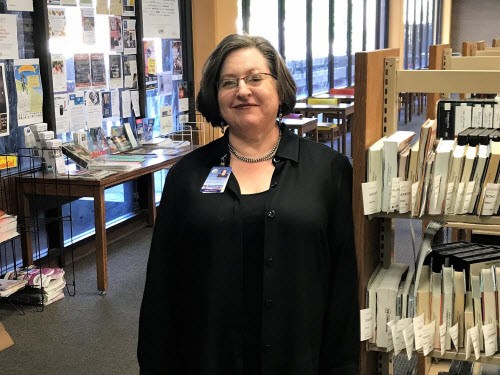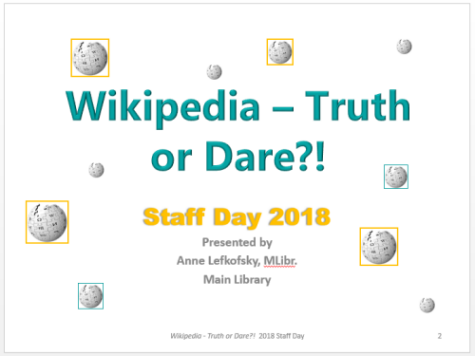Librarians Who Wikipedia: Anne Lefkofsky, Librarian, Public Library Albuquerque and Bernalillo County
Wikipedia + Libraries: Better Together is an OCLC project that is building bridges between public libraries and Wikipedia. In the fall of 2017, WebJunction ran a nine-week online training program for US public library staff. Librarians Who Wikipedia is our series of interviews with library staff who engage with Wikipedia.

Anne Lefkofsky, a public librarian in New Mexico, advocates for including Wikipedia in librarianship.
Image courtesy Anne Lefkofsky.
With nearly three decades of experience in librarianship, Anne Lefkofsky joined the OCLC Wikipedia + Libraries course in 2017 to expand her professional toolkit by learning with other librarians about Wikipedia. Intrigued by the opportunities that Wikipedia offers libraries to better serve patrons, she has now created a training, “Wikipedia Truth or Dare,” that she is delivering to staff regionally. With a focus on information literacy, the training guides colleagues on how and why to extend librarianship with Wikipedia.
You made a presentation called “Wikipedia: Truth or Dare” and you’ve got additional training sessions on deck. Tell us, how did it go?
The presentation was an outcome of my participation in the course, where my goal was to help staff realize they have a role to play in taking Wikipedia forward. We can have a proactive and participatory role in using, creating, and interpreting Wikipedia, regardless of our duties in the library system. To prepare for the presentation, I administered a 12-question survey to the 200 staff across 18 locations in our system. The great response rate exceeded my expectations—70 took the survey!
During the session, I included learnings from that survey, as well as those from an older meeting activity where library staff did a blind read of three articles about a topic—one of the articles was from Wikipedia (but they didn’t know it). The majority of the respondents chose the Wikipedia article as the most reliable—over two articles from library databases! So, I brought this up and sought to have an open conversation that neither buried nor praised Wikipedia—but rather, explored and understood its power and potential. This provided the opportunity to refresh our professional skills and reflect on how we support information literacy. Staff were interested and engaged. They asked good questions and we all walked away with more to think about.
Tell us more about your colleagues’ perceptions of Wikipedia? Did anything surprise you?

Anne circulated a survey to 200 colleagues and used their responses to design her training.
A few of the responses surprised her. Image courtesy Anne Lefkofksy.
I learned we all use it in our personal lives for information. Although only a few had contributed to Wikipedia, most were curious. Library staff indicated they would use Wikipedia for some topics, but would avoid it for topics covered in the subscription databases, medical questions, or academic research. That surprised me because I don’t hear people questioning whether or not subscription services are current, and applying their critical lenses to it. I’d also make the argument that if we avoid a topic on Wikipedia, that’s an opportunity to edit it into something that you and your patrons would use.
Information literacy has been a core concept for you. Tell us what Wikipedia brings to this?
We often take the easiest route to satisfying our information needs. Information literacy is about understanding how to identify, find, and evaluate what we encounter. We can help people do this by acknowledging where we get information, and evaluating it with our patrons. But we’ve gotten away from modeling this kind of behavior when answering questions. I think citing our own sources when we provide information should be the standard, and Wikipedia is a good exemplar of a resource that does this, because of its citations. There are signs and markers to help you evaluate the content. And understanding how editing happens is much richer than evaluating front-page content alone. Editing helps you see the whole production cycle. Wikipedia has revealed itself as a wonderful tool for information literacy.
"...there are so many possibilities with Wikipedia. I would encourage library staff to see how Wikipedia isn’t supplanting traditional ways of knowing, it’s giving us a way to extend our reach."
What message would you like to share with other librarians?
I see that there are so many possibilities with Wikipedia. I would encourage library staff to see how Wikipedia isn’t supplanting traditional ways of knowing, it’s giving us a way to extend our reach. We’re positioned to do that. We have a lot of limitations in our profession—we’re understaffed, folks put in long, hard days—but limits present us with opportunities. I think we can hold true to what we want to do, and seek out other ways of doing things: I’ve collided with Wikipedia.
Wikipedia provides an opening—it shows that you can start from where you are and be entrepreneurial. We need the wisdom to know how things work, but needing wisdom shouldn’t stand in the way of trying something new. I’d like to think there can be both. You have to look forward and look upward. Wikipedia is a good example on where to keep your gaze—both in the process and in the opportunity.
